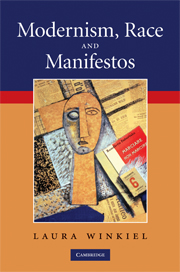Book contents
- Frontmatter
- Contents
- Acknowledgments
- Chapter 1 Introduction: manifestos, race, and modernity
- Part I COSMOPOLITAN LONDON, 1906–1914
- Part II TRANSNATIONAL MODERNISMS, 1934–1938
- Chapter 5 Nancy Cunard's Negro and black transnationalism
- Chapter 6 Reading across the color line: Virginia Woolf, C. L. R. James, and Suzanne and Aimé Césaire
- Epilogue: Manifestos: then and now
- Index
Chapter 5 - Nancy Cunard's Negro and black transnationalism
Published online by Cambridge University Press: 22 September 2009
- Frontmatter
- Contents
- Acknowledgments
- Chapter 1 Introduction: manifestos, race, and modernity
- Part I COSMOPOLITAN LONDON, 1906–1914
- Part II TRANSNATIONAL MODERNISMS, 1934–1938
- Chapter 5 Nancy Cunard's Negro and black transnationalism
- Chapter 6 Reading across the color line: Virginia Woolf, C. L. R. James, and Suzanne and Aimé Césaire
- Epilogue: Manifestos: then and now
- Index
Summary
The manifesto as represented in the first part of this book intervenes in national discourse by staging alternative communities of avant-garde artists and performers, mothers, and women suffragists and socialists. It exhorts these communities to seize the present moment in order to produce a history and a modernity alternative to the “homogeneous empty time” of the rationalized present. Part I situated England within its empire so that the contradictions of race and colonial modernity are visible within manifestos and trouble bourgeois nationalism. Part II, “Transnational Modernisms,” foregrounds the emergent rhetoric of decolonization and black transnational community formation articulated in black manifestos, as well as in the anticolonial rhetoric of international communism. This chapter highlights this rhetoric and community formation in order to reread Nancy Cunard's anthology Negro within the transnational circulation of manifestos and other important black publications, such as: W. E. B. Du Bois's “London Manifesto;” Langston Hughes's artist statement “The Negro Artist and the Racial Mountain” excerpted in Paulette Nardal's “L'Éveil de la conscience de race chez les étudiants noirs” (The Awakening of Race Consciousness), published in Le Revue du monde noir in April 1932; and the publication in the Harlem-based newspaper New York Age of an article, “Color in England,” that featured an interview with Dr. Harold Moody of the London-based League of Coloured Peoples on racial discrimination, as well as the group's founding proclamation.
- Type
- Chapter
- Information
- Modernism, Race and Manifestos , pp. 157 - 190Publisher: Cambridge University PressPrint publication year: 2008



